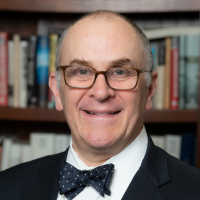Ronald Reagan: The Peacemaker
Examine how Ronald Reagan confronted the Soviet Union and won the Cold War.
July 10–14, 2023
Washington, DC
In the fourth week of Political Studies, fellows will reflect on the art and craft of democratic statesmanship. Statesmanship is distinct from ordinary political leadership. It suggests a certain quality of excellence in both leadership and judgment. It also appears to be an activity at odds, or at least in tension, with democracy. In democracy, the people are said to rule. Yet democracy needs statesmanship to establish it, to sustain it, and perhaps to justify it. Is democratic statesmanship an oxymoron? How is the statesman different not only from the ordinary politician, but from the tyrant?
One seminar will offer a comparative approach, with a study of the speeches and deeds of two of the greatest statesmen of the last century: Franklin D. Roosevelt and Winston Churchill. The second will take a narrower focus on Lincoln, bringing together the study of history and rhetoric to understand Lincoln’s statecraft in conjunction with his literary craft.
Image: Sir Winston Churchill speaks at the Hall on Thanksgiving Day, Royal Albert Hall, 1944 | Print of Lincoln’s cabinet based on Carpenter painting, Library of Congress
Diana Schaub on Lincoln's Second Inaugural
This course is part of our residential Political Studies Program. Fellows participate in morning seminars and meet prominent men and women in public life over afternoon and evening sessions. Up to 36 fellows will be selected.

Diana Schaub is a nonresident senior fellow at the American Enterprise Institute (AEI), where her work is focused on American political thought and history, particularly Abraham Lincoln, Frederick Douglass, African American political thought, Montesquieu, and the relevance of core American ideals to contemporary challenges and debates. Concurrently, she is Professor Emerita of Political Science at Loyola University Maryland, where she taught for almost three decades.

Diana Schaub is a nonresident senior fellow at the American Enterprise Institute (AEI), where her work is focused on American political thought and history, particularly Abraham Lincoln, Frederick Douglass, African American political thought, Montesquieu, and the relevance of core American ideals to contemporary challenges and debates. Concurrently, she is Professor Emerita of Political Science at Loyola University Maryland, where she taught for almost three decades.
An expert in political philosophy, Dr. Schaub has lectured on a variety of topics and participated in conferences around the country. She has contributed chapters to multiple books on Shakespeare, liberal education, women, and religion, and she is the author of three books: His Greatest Speeches: How Lincoln Moved the Nation (St. Martin’s Press, 2021); What So Proudly We Hail: The American Soul in Story, Speech, and Song, coedited with Amy and Leon Kass (ISI Books, 2011); and Erotic Liberalism: Women and Revolution in Montesquieu’s “Persian Letters” (Rowman & Littlefield, 1995). Her monograph Emancipating the Mind: Lincoln, the Founders, and Scientific Progress (AEI, 2018) is based on her remarks at the 2018 Walter Berns Constitution Day Lecture.
Dr. Schaub has also been published in the popular press, including in the Baltimore Sun, the Claremont Review of Books, Commentary, and the Wall Street Journal.
Dr. Schaub has a PhD and an MA in political science from the University of Chicago. Her BA in political science is from Kenyon College.

Flagg Taylor is the Executive Director of the Center for Civics, Culture, & Society, at Miami University. His research specialty is in the history of political thought and American government, especially the question of executive power. He is Chair of the Academic Council of the Victims of Communism Memorial Foundation.

Flagg Taylor is the Executive Director of the Center for Civics, Culture, & Society, at Miami University. His research specialty is in the history of political thought and American government, especially the question of executive power. He is Chair of the Academic Council of the Victims of Communism Memorial Foundation.
He is the co-author of The Contested Removal Power, 1789-2010, author of numerous articles, and editor of The Great Lie: Classic and Recent Appraisals of Ideology and Totalitarianism and The Long Night of the Watchman: Essays by Václav Benda, 1977–1989. He holds a Ph.D. and an M.A. in political science from Fordham University and a B.A. from Kenyon College.
Recommended Reading:
Lincoln and the Constitution, What So Proudly We Hail
Readings:
Discussion Questions:
Readings:
Discussion Questions:
Readings:
Discussion Questions:
Readings:
Discussion Questions:
Readings:
Discussion Questions:
On Statesmanship & Virtue
On Statesmanship & Knowledge
Churchill & The Problem of Appeasement
FDR & The Problem of Isolation
Churchill & England Stand Alone
FDR & America on the Brink
FDR, Churchill, & the Decision for Operation Torch
Reflections on Churchill
Reflections on FDR

William Inboden
William Inboden is Executive Director and William Powers, Jr. Chair at the Clements Center for National Security at the University of Texas-Austin. Previously he served as Senior Director for Strategic Planning on the National Security Council at the White House.

Vickie Sullivan
Vickie Sullivan is the Cornelia M. Jackson Professor of Political Science and teaches and studies political thought and philosophy. She also maintains teaching and research interests in politics and literature. She has published extensively on Montesquieu and Machiavelli and is the co-editor of Shakespeare’s Political Pageant.

Adam J. White
Adam J. White is the Laurence H. Silberman Chair in Constitutional Governance and senior fellow at the American Enterprise Institute, where he focuses on the Supreme Court and the administrative state. Concurrently, he codirects the Antonin Scalia Law School’s C. Boyden Gray Center for the Study of the Administrative State.

Eliot Cohen
Eliot Cohen is the Robert E. Osgood Professor at the Johns Hopkins University’s School of Advanced International Studies (SAIS) where he has taught since 1990. He served as Dean of SAIS from 2019 to 2021. In addition to public service in the Department of Defense he served as Counselor of the Department of State from 2007 to 2009.

Vance Serchuk
Vance Serchuk is Executive Director of the KKR Global Institute and an Adjunct Senior Fellow at the Center for a New American Security. Prior to joining KKR, Mr. Serchuk served for six years as the senior national security advisor to Senator Joseph Lieberman (I-Connecticut).